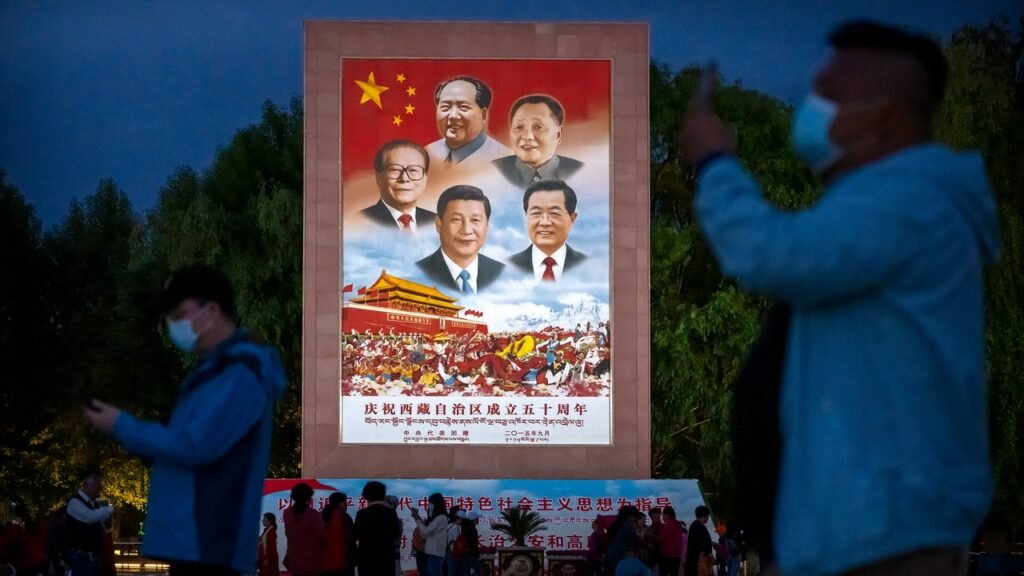The Father of Chinese language Authoritarianism Has a Message for America

When Russian and Chinese language élites speak about historical past, they usually imply “Historical past”—the grand Hegelian march towards progress. For the reason that finish of the Chilly Battle, the East has lived with the undignified thesis, popularized by Francis Fukuyama’s 1989 essay “The Finish of Historical past?,” that democracy had defeated the authoritarian alternate options of the 20 th century. That concept has not aged nicely. Based on a European survey of greater than 2 hundred nations, 2022 was the primary time in twenty years that closed autocracies outnumbered liberal democracies on the planet. People have turn into unreliable underwriters of the worldwide order. Russia’s Vladimir Putin has incited Europe’s largest battle for the reason that Second World Battle and China’s Xi Jinping is remaking world establishments in his personal picture, bereft of democratic values. When Xi visited the Kremlin in March, 2023, a bit of over a 12 months after Russia invaded Ukraine, he informed Putin that the world was altering in methods “we haven’t seen in 100 years.” “Let’s drive these adjustments collectively,” he mentioned. Putin, fingers outstretched, nodded. “I agree.”
Donald Trump’s victory this November turned what some dismissed as an electoral fluke, in 2016, into a permanent political actuality. “We’ve gained,” Aleksandr Dugin, the Russian ideologue recognized to some as “Putin’s thinker,” proclaimed on X. “Globalists have misplaced their ultimate fight. The longer term is lastly open. I’m actually pleased.” Ren Yi, a blogger and grandson of a former Chinese language Communist chief, wrote that Trump’s win, alongside together with his chumminess with Elon Musk, has created one thing of a “techno-authoritarian-conservative” alliance that resembled the authoritarian cultures of East Asia. “The ‘beacon’ of the free world, america, will lead varied nations into intolerant democracy,” Ren predicted. “There isn’t a finish to historical past, solely the tip of the Fukuyama-ists.”
The morning after the U.S. election, I acquired a message from a seventy-eight-year-old historian in Shanghai named Xiao Gongqin. “I’ve predicted on a number of non-public events that Trump would win,” he wrote. Trump, he reasoned, was a vital corrective towards a “woke left” that “had actually gone overboard in recent times.” This degree of antipathy towards American progressives isn’t unusual amongst Chinese language liberals, who, since 2016, have flocked towards Trump, partially to repudiate a Democratic Social gathering whose emphasis on political correctness—actual or imagined—reminds them of China’s previous disasters in socialist governance. However Xiao isn’t a liberal, and his well-known anti-democratic affect on Chinese language politics made him an instructive voice on America’s present predicament.
Xiao is the architect of a principle of strongman politics referred to as “neo-authoritarianism.” Within the nineteen-eighties, reformers with various predilections for democracy and capitalism consolidated energy in Communist states. Mikhail Gorbachev restructured the Soviet Union’s deliberate economic system and loosened censorship. In China, Deng Xiaoping ushered in an period referred to as “reform and opening up,” although the reforms went solely to this point; he additionally evinced a restricted tolerance for dissent, believing full democracy untenable. On this, he was supported by a bunch of Chinese language thinkers led by Xiao and a prodigious Shanghai tutorial named Wang Huning. The phrase “authoritarian” is a rote pejorative within the West, synonymous with tyranny, however within the China of the late twentieth century Xiao and his allies managed to reframe it as a rational, pragmatic, East Asian-specific technique for modernization. Drawing on a variety of sources—Chinese language historical past; Samuel Huntington’s principle of “modernizing authoritarianism”; the Asian “dragons” of Singapore and South Korea, which had grown quickly beneath authoritarian rulers—these intellectuals pushed, and provided the ethical ballast, for China to postpone the tip of historical past.
Wang entered authorities in 1995 and shot by its ranks. He’s now certainly one of Xi Jinping’s closest advisers, the preëminent craftsman of Xi’s authoritarian ideology. Xiao, who coined the time period “neo-authoritarianism” at a symposium in 1988, continued his advocacy as a professor in Shanghai, till he retired a decade in the past. His argument that democracy was a “rootless politics,” alien to Chinese language tradition, stays a part of a dominant pressure of the nation’s thought. Whether or not Xiao had influenced the Social gathering’s route or merely justified it’s laborious to say. However, in 1988, Deng was briefed on “neo-authoritarianism” by one other Chinese language chief, who described it as a system the place a “political strongman stabilizes the state of affairs and develops the economic system.” Deng reportedly responded, “That’s precisely what I stand for”; his solely qualm was that it may use a rebrand. Later, as China’s economic system took off, the world would settle for extra diplomatic names—“state capitalism” or, extra vaguely, “the China mannequin.”
As a author protecting Chinese language tradition and politics, I’ve watched with a way of foreboding as America has begun to manifest the identical authoritarian compulsions which have lengthy dominated Chinese language life. There’s a cosmic irony in the best way that the twenty-first century has performed out: the West, hoping its adversaries would turn into extra prefer it, has inextricably turn into extra like them. Slowly, concepts that Xiao and his allies had propagated a long time in the past—the stabilizing drive of the strongman and a reverence for cultural traditions—appear to have arrived within the management middle of the world’s strongest liberal democracy.
After Trump’s latest victory, I made a decision to pay Xiao a go to. I needed to know the scholar who had helped salvage the strongman from the dustbin of historical past, and to know what he fabricated from the determine’s current, and certain future, proliferation. What I discovered, to my shock, was a person quietly wrestling with the implications of his concepts. Xiao has deeply conservative instincts—he counts Edmund Burke and Michael Oakeshott amongst his influences—however he was, and is, an incrementalist who goals of China turning into a “constitutional democracy.” His was a principle of enlightened rule, whereby a dictatorship would vanquish the “radicals,” steward an financial miracle, after which, ideally, relinquish energy to the individuals. He had ready-made examples in locations equivalent to Taiwan, whose chief Chiang Ching-Kuo dismantled his personal autocracy earlier than his dying, in 1988. Xiao has not disavowed authoritarianism, and he even appeared to help America’s New Proper. However because the quick prospects for democracy have all however vanished from China, his politics have shifted from response to reflection. Authoritarianism, Xiao informed me, “has its personal issues.”
When Xi Jinping got here to energy, in 2012, he used his newfound authority to launch an anti-corruption drive, which Xiao endorsed. Since then, although, Xi has abolished Presidential time period limits, decimated civil society, and intensified clampdowns on free expression. As a mainland Chinese language scholar, Xiao was cautious to not betray his views concerning the regime. He as a substitute spoke to what he now sees as an unsolvable “dilemma” in his principle. A democrat dangers welcoming harmful concepts right into a tradition—concepts that, authentic or not, may hasten a nation’s demise. Xiao turned to authoritarianism partly as a result of he believed that China was careening in that route. And but “a neo-authoritarian chief should be clever,” Xiao informed me, with a touch of exasperation. “And he might not be.” When you pin your hopes on a justice-delivering strongman, in different phrases, he might take the righteous path, or he might not. The one certainty is that he has management.
On an overcast Monday night, I arrived at a low-rise house tower in Shanghai, the place Xiao lives together with his spouse. He’s a sprightly man, with salt-and-pepper hair and wispy bangs that he brushes to 1 aspect. Every single day, for twenty years, he has saved to an intense train routine—100 and fifty squats and greater than 300 volleys of a squash or tennis ball exterior. Throughout that point, he has been laborious at work on a hefty three-volume historical past of China from antiquity to Deng’s “reform and opening up.” (He hopes to finish it by 2030.) Xiao has an obsession with classical music. He usually leads friends right into a spartan lounge, the place he exhibits off an outsized speaker system on which he spent tens of hundreds of {dollars}. (“My total life financial savings,” he informed me.) On my go to, we listened to the German violinist Anne-Sophie Mutter’s rendition of the “Carmen Fantasy,” at a quantity suited to the laborious of listening to.
Within the days after the U.S. election, Xiao wrote an essay on his weblog during which he opined concerning the consequence’s geopolitical ramifications. He feared that Trump’s isolationist bluster would lead some Chinese language to underestimate U.S. commitments to Taiwan, elevating the “chance of direct battle between the U.S. and China.” Throughout our assembly, nevertheless, he additionally expounded on how the nations had been related. China’s neo-authoritarianism within the eighties, he informed me, shared a standard enemy with at present’s Republican Social gathering: the “romanticism” espoused by the “radical liberals.”
Xiao used the time period romanticism to explain the assumption, impressed by the Enlightenment, that humanity can design very best societies by cause. He criticized this view for disregarding historical past and expertise—or, to riff on an outdated adage, for “making the proper the enemy of the possible.” Xiao, who was born in 1946 and grew up beneath Maoism, witnessed the worst excesses of this type of armchair statecraft. When Mao launched the Cultural Revolution, in 1966, Xiao had lately graduated highschool and was working in a manufacturing unit. He hadn’t been in a position to enter college, doubtless for harboring “bourgeois” sympathies—together with his ardour for Western philosophy—and he allied himself with the Purple Guards as a frontrunner of a “insurgent employee faction” at his equipment plant. However, because the revolution wore on, he himself was denounced as a “revisionist,” and he spent the subsequent a number of years consigned to gruelling work on the manufacturing unit.
Shortly after Mao died, in 1976, the reckoning started. Crowds gathered round a Democracy Wall close to Beijing’s Tiananmen Sq. to submit calls for for freedom and accountability. Intellectuals referred to as for a “New Enlightenment,” and an iconoclastic 1988 documentary, “River Elegy,” in contrast Chinese language civilization to a muddied Yellow River that was in want of a “good scrubbing.” Within the frenzy to repudiate the previous, Xiao noticed historical past repeating itself. The Cultural Revolution had cemented his religion in a liberal modernity, nevertheless it additionally, paradoxically, instilled a visceral concern of that modernity’s real-life accelerants. Within the spirit of William F. Buckley, Jr., the architect of contemporary American conservatism, Xiao stood “athwart historical past yelling Cease.”
The seeds of “neo-authoritarianism” got here to Xiao round 1983, when he was researching republican China, the nation’s first main try at democracy. The experiment adopted the overthrow of China’s final imperial dynasty, in 1911, and was seen by a lot of Xiao’s coevals as a fount of inspiration. However what Xiao discovered was full and utter chaos. “The Nationwide Meeting couldn’t do something besides mess issues up,” Xiao informed me. “The events would simply go at one another with complete disregard for the nation’s pursuits.” China, Xiao concluded, lacked the “software program system” for democracy: a civil society, a rule of regulation, a tradition of political bargaining and compromise. “I don’t imply to say that I’m basically against Western democracy,” Xiao informed me. “I personally really feel very envious of america and the West.” However, he went on, transferring the system over is implausible as a result of China “lacks so lots of the situations.” What China wanted was one thing like a ultimate emperor, the breaker of the despotic chain who would summon modernity by fiat. Xiao reverse-engineered democracy again to the strongman: “So as to have democracy, there should be civil society,” he informed me. A civil society requires financial prosperity; financial prosperity requires political stability; and political stability “requires a strongman.”
In 1988, Xiao launched his principle at an instructional symposium, and “neo-authoritarianism” formally entered the general public discourse. The thought was reviled by liberal intellectuals, who accused Xiao of rationalizing the established order—or, worse, tilting China again towards the system that it had simply escaped. However his principle appeared to reflect the temperament of Deng, who, for all his reformist tendencies, was a ruthless apparatchik. All through his reign, the person hailed as a practical liberalizer jailed Democracy Wall activists and denounced unwelcome international concepts as “non secular air pollution.” Within the spring of 1989, college students gathered in Tiananmen Sq. to protest for higher political freedoms. Intellectuals led by the literary critic Liu Xiaobo joined a starvation strike in solidarity. Deng imposed martial regulation and accepted the ultimate order to clear the sq..





